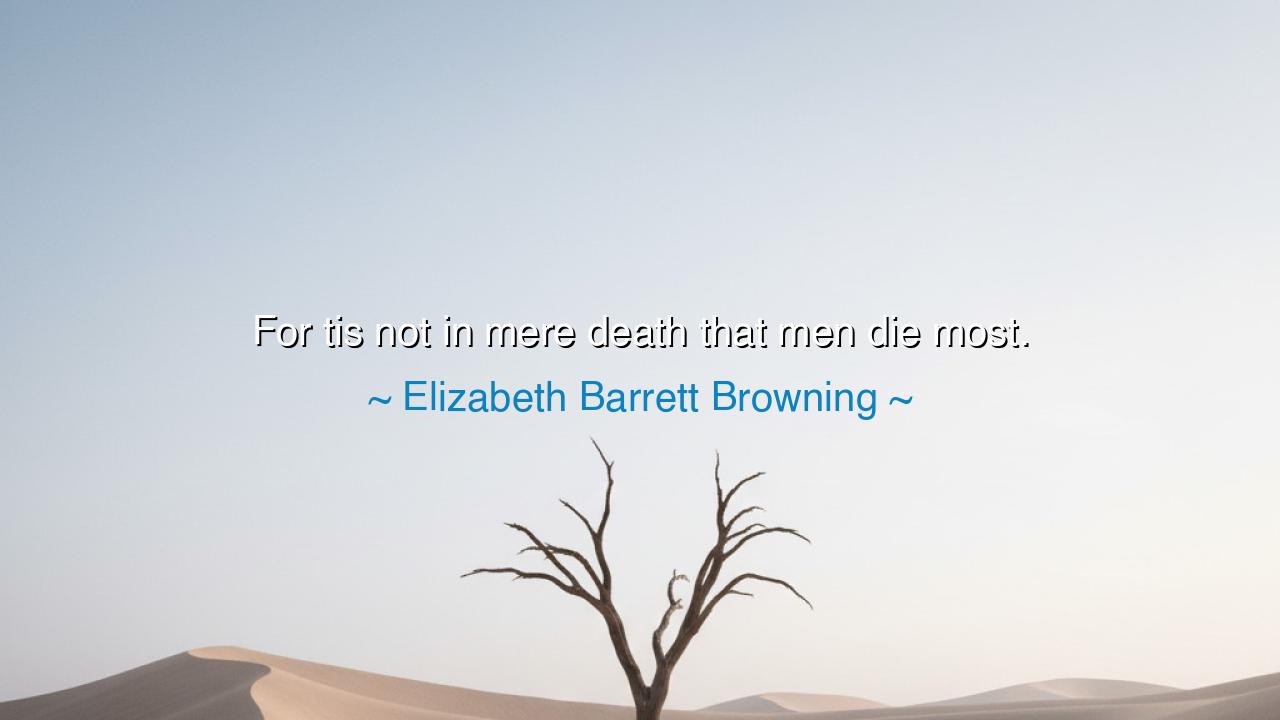
For tis not in mere death that men die most.






"For ’tis not in mere death that men die most." — thus wrote Elizabeth Barrett Browning, the poet whose soul burned with both tenderness and moral fire. In this single, piercing line, she revealed a truth that stands beyond centuries: that death is not always the final defeat, nor life the certain proof of being alive. There are deaths of the spirit, quiet and unseen, that wound the soul far deeper than the grave. Many walk the earth breathing, yet they have ceased to feel, to hope, to love. And many have died in body, yet live eternally in the hearts they touched. Browning’s words are not a lament but a call — a call to awaken before such inward dying claims us.
The meaning of this quote rests upon the difference between physical death and spiritual death. Browning reminds us that a man does not perish only when his body returns to dust, but also when he abandons the divine fire within him — his courage, his truth, his capacity to love. When fear silences conviction, when selfishness overcomes compassion, when the heart grows cold to beauty and meaning, then something far greater than the body dies. To live, truly live, is to keep alive the immortal part of the self — that which refuses to yield to apathy, despair, or moral decay. It is not death that destroys humanity, but the surrender of the soul to emptiness.
The origin of Browning’s words can be traced to her lifelong meditation on the human spirit. Born in an age of both faith and doubt, she was surrounded by suffering — physical illness, societal injustice, and the limits placed on women’s voices. Yet her poetry rose from this pain, aflame with hope and defiance. In works such as Aurora Leigh and The Cry of the Children, she wrote not of resignation, but of spiritual resistance — the refusal to let the light of conscience die amid the darkness of the world. When she wrote that men do not die “in mere death,” she spoke from her own endurance: though her body was frail, her will was unbroken. Her life was proof that to live nobly is to triumph over decay.
This truth echoes through the lives of countless souls across history. Consider Socrates, who drank the cup of hemlock but died without bitterness. His body perished, but his wisdom, courage, and moral clarity have lived for millennia. He did not die most in death; rather, those who condemned him — fearing truth, loving comfort more than justice — were the ones truly dead within. Or think of Anne Frank, who, in the shadow of unspeakable evil, kept her spirit alive through hope and faith in human goodness. Her words still breathe, long after her mortal form was silenced. These are the examples of those who lived greatly, proving that the measure of life is not its length, but the light of the soul that shines within it.
Browning’s line also warns us against the slow deaths that creep unnoticed through the days of ordinary living — when routine replaces purpose, and cynicism replaces wonder. Every time we betray our better nature, every time we harden ourselves to the pain of others or abandon our dreams for the ease of comfort, we die a little. The poet, ever the seer, reminds us that death is not only an end but a state — and that many inhabit it long before their final breath. Thus, she implores us: guard your soul fiercely, lest you lose it not to the grave, but to indifference.
Yet her words are not meant to instill fear, but resolve. If it is true that there are deaths of the spirit, then it is also true that there are resurrections. Every act of love, every moment of forgiveness, every choice to stand for truth revives what the world tries to bury. A man who has lost hope can live again through courage; a heart that has grown numb can be rekindled by compassion. As long as we breathe, there remains the power to rise from our smaller deaths. In this way, Browning’s line becomes not a lamentation but a commandment to live fully — to live in such a way that our souls never go cold.
The lesson is clear: beware the death that wears the face of comfort, the grave that smiles through complacency. Let not your spirit wither in fear of failure or sorrow. Live bravely. Speak kindly. Stand for what is right, even when the cost is great. Seek beauty, even in brokenness. Keep alive within you that divine spark which no shadow can extinguish. For the body will one day rest, but the soul that has loved, dreamed, and struggled for good will never truly die.
So remember, O seeker of wisdom: the truest death is not of flesh, but of the fire within. And as Elizabeth Barrett Browning teaches, to live with integrity, courage, and compassion is to triumph over death itself. Keep your spirit awake, your heart open, and your soul aflame — for in doing so, you will live beyond all endings.






AAdministratorAdministrator
Welcome, honored guests. Please leave a comment, we will respond soon